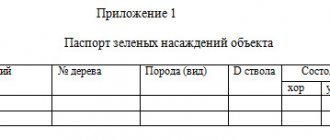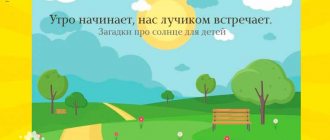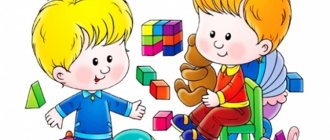Analysis of the implementation of regime moments in preparatory group No. 3
Reception of children, sleep, washing, hardening, undressing, morning exercises, etc.)
Morning reception. I came to work. I ventilated the group, reviewed the plan, and prepared manuals. Gradually the children began to arrive.
A child, in a hurry to be the first to play with building material, carelessly folds his clothes. I remind him that things need to be put neatly in the closet. The teacher simultaneously carries out various tasks: receives children, talks with parents, organizes games, and carries out the work planned for the morning. I conducted individual work with Masha on speech development, organized didactic games with several children, and had a conversation with another on the topic “What children see on the way to kindergarten.”
Then, I suggested that the children collect their toys and prepare for morning exercises. Morning exercises. I (the teacher) suggested that they line up according to their height and take the children to the gym.
After gymnastics, the children return to the group with the teacher and begin to change clothes.
Duty. Those on duty wash their hands first and put on white aprons and caps. Then the assistant teacher stays with those on duty and helps them set the table.
Washing. I suggested to the children who had already changed their clothes to go to the washroom to wash their hands. She suggested remembering the washing procedure.
Breakfast. Children gradually sit down at the tables without making noise. I wish them “Bon appetit!” At the end of breakfast, the nanny, with the help of the attendants, clears the tables. At this time, I (the teacher) are preparing for classes.
Preparing for a walk. The teacher invites the children to collect toys. Children who have cleaned up after themselves are encouraged to go to the toilet and go to the dressing room, reminding them of the dressing order. At the same time, I help the children get dressed and talk about what they will do during the walk.
Returning from a walk. At the end of the walk, I invite the children to finish playing and get together in a group. Children collect toys, line up in pairs and enter the kindergarten, wipe their feet clean on the rug and walk quietly, without making noise, along the corridor.
Preparing for lunch. I remind you of the washing procedure. Children go to the tables.
Dinner. The teacher creates a calm environment, regulates the children’s behavior at the table, and reprimands those who are naughty. Encourages children to finish their food. At the end of the meal, the children say “thank you.”
Preparation for sleep. The children gradually enter the bedroom, I warn them that they must enter quietly and not talk. They begin to undress, I make sure that the children undress in the correct sequence and carefully put their things on the chair. The teacher remains in the bedroom until all the children fall asleep.
Planning the morning time slot at the preschool educational institution
Recommendations for teachers on planning the morning period of time in preschool educational institutions.
It is necessary to remember that the morning is a calm, routine moment.
The main task of pedagogical work in the morning is to include children in the general rhythm of life of the kindergarten, to create in them a cheerful, cheerful mood. It is very important to do emotionally stimulating gymnastics here. Work is carried out in subgroups and individually. If we talk about frontal work, it can be round dances and quiet activities. Morning reception is the most favorable time for individual communication between the teacher and each child. During these hours, individual work with children on various types of activities is successfully carried out. Its distinctive feature is ease, reliance on the child’s interest and curiosity, on the entertaining form and content of the activities. This is work on correcting and educating children in correct sound pronunciation, on developing oral speech and developing correct intonation, on physical education (stimulating motor activity). When planning individual work with children, the teacher specifically indicates the names of those pupils with whom the work will be done and prescribes what kind of work. In terms of content, the morning period of time includes: • play activities, • conversations with children, • examination of objects and illustrations, • short observations in nature and phenomena of social life. It is good to plan short conversations in the morning with a group of children or individual children on pre-planned topics and topics that arose on the initiative of the children. So, in the calendar plans of the junior and middle groups, the teacher schedules short conversations with children about close people and accessible objects and phenomena of the world around them: about mom, dad and grandmother, about younger brothers and sisters, about toys, books, natural objects and much more. Often such conversations are accompanied by viewing illustrations. In the calendar plans of the senior group, in addition to those indicated above, conversations are planned with and without looking at illustrations on more complex topics: about the seasons, about domestic and wild animals, about the life of their hometown. When planning specific activities, it is important to take into account the nature of the immediate educational activity ahead. If the GCD is of a calm nature, requiring mental activity and perseverance of children, such as, for example, GCD for the formation of elementary mathematical concepts, speech development (learning a poem, retelling), children’s activities are planned for the morning, causing their physical activity, and, vice versa, if GCD presupposes greater mobility for children (physical development, musical development), then morning activities should be calmer. Number of types of activities in the morning: • in the junior and middle - 3-4 types, • in the senior preparatory group - 4-6 types, depending on the children of the group. The teacher himself determines how many types of activities there should be based on approximate canons. Planning of educational activities in the morning period of time Date:_________________________________________________________________________ Educator:___________________________________________ Time Task Activity What we indicate in the plan What is accomplished Morning period of time Include children in the general rhythm of life of the kindergarten create a cheerful, cheerful mood teaching children to plan design activities creating conditions for meaningful individual selective activities in accordance with their interests individual communication between teachers and each child individual work on various types of activities work on correcting incorrect sound pronunciation on speech development development of correct intonation on physical education play activities conversations with a subgroup of children at the initiative of an adult conversations on a topic proposed or chosen by the child (by children) examination of illustrations observation in nature observation of phenomena of social life work activity examination of folk toys, embroidery, dishes, etc. visual activities at the request of children work on developing cultural and hygienic skills - names of children, with whom we will work - in what section of the program - type, form and name of work - topic of conversation - questions - daily work (duty) not every day, if a new type of duty is introduced - complication of work - change in working conditions - conditions for the development of the game - management techniques for gaming activities - attributes and equipment for games with a group or subgroup of children - the name of the games - techniques for arousing interest in outdoor games - what is being observed, for what purpose - what type of work - how responsibilities in work are distributed - conditions for independent activity - type of entertainment - who participates - motivating children for activity - types of games : - type of game, plot-based, board-printed, didactic - conditions created by the teacher - management techniques Recommendations _________________________ This material will help the teacher plan work in the morning, do self-analysis, as well as the senior teacher to carry out thematic control on this problem
We recommend watching:
Long-term work plan for fine arts and the development of creative abilities in the middle group Long-term work plan for fine arts and the development of creative abilities in the senior group Long-term planning for modeling from salt dough for children of the preparatory group Thematic planning in the senior group. Traffic rules circle
Similar articles:
Perspective-thematic planning in kindergarten
Long-term plan for oral folk art in the senior, preparatory group




